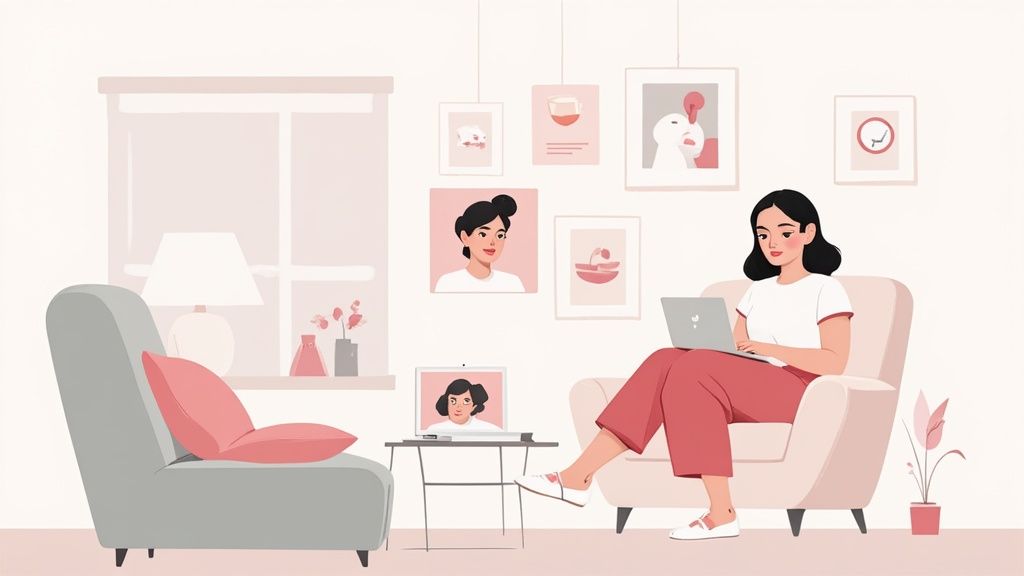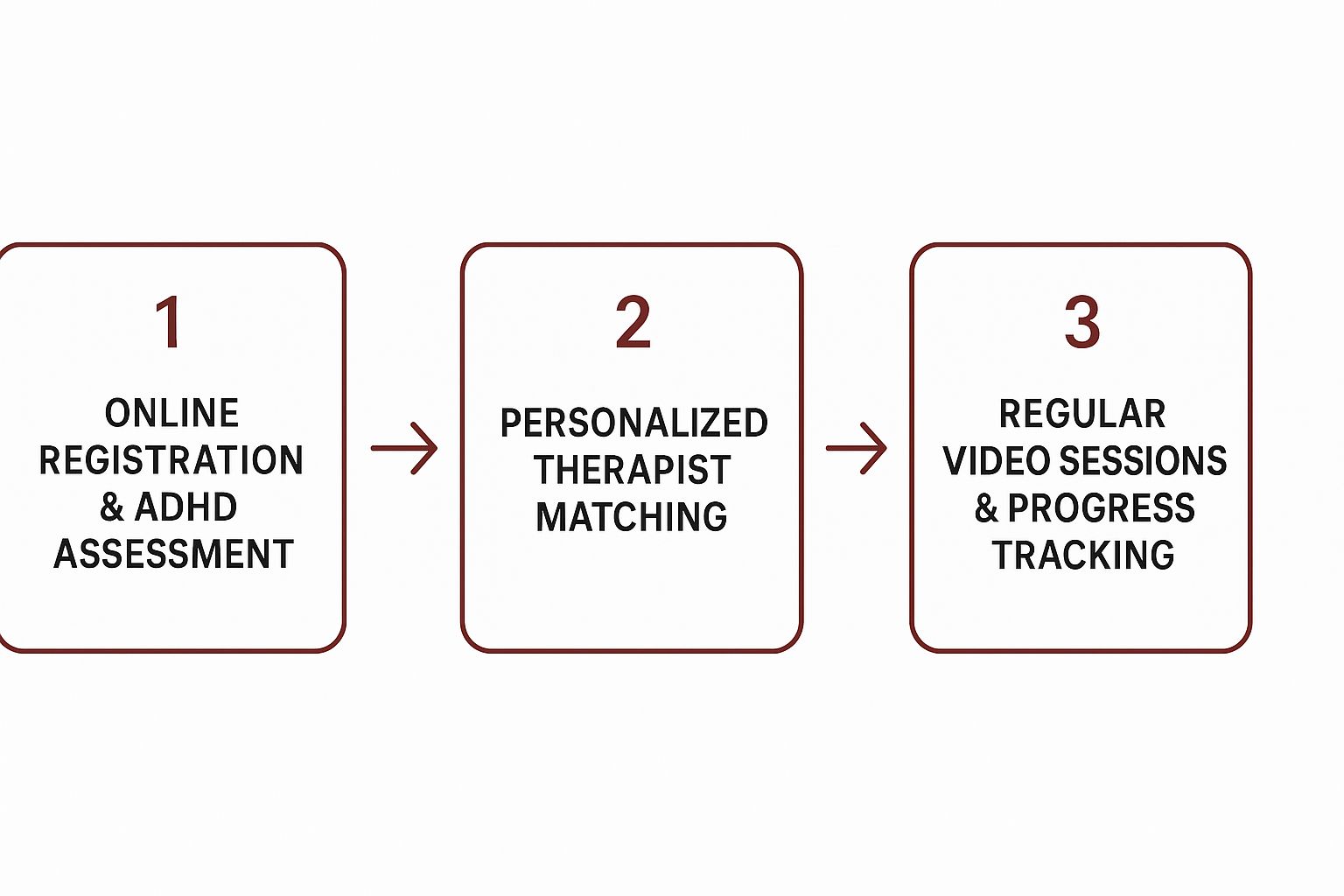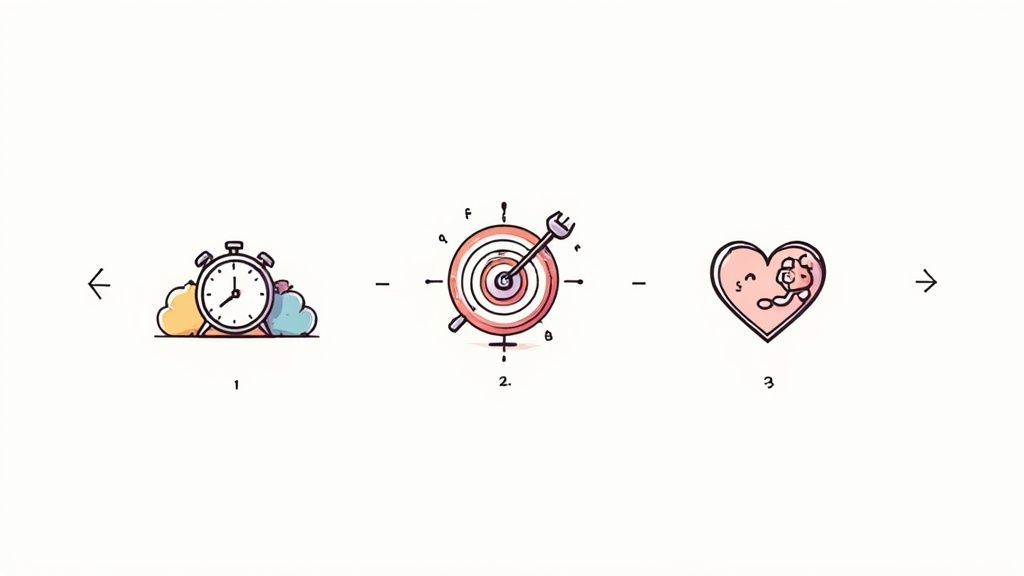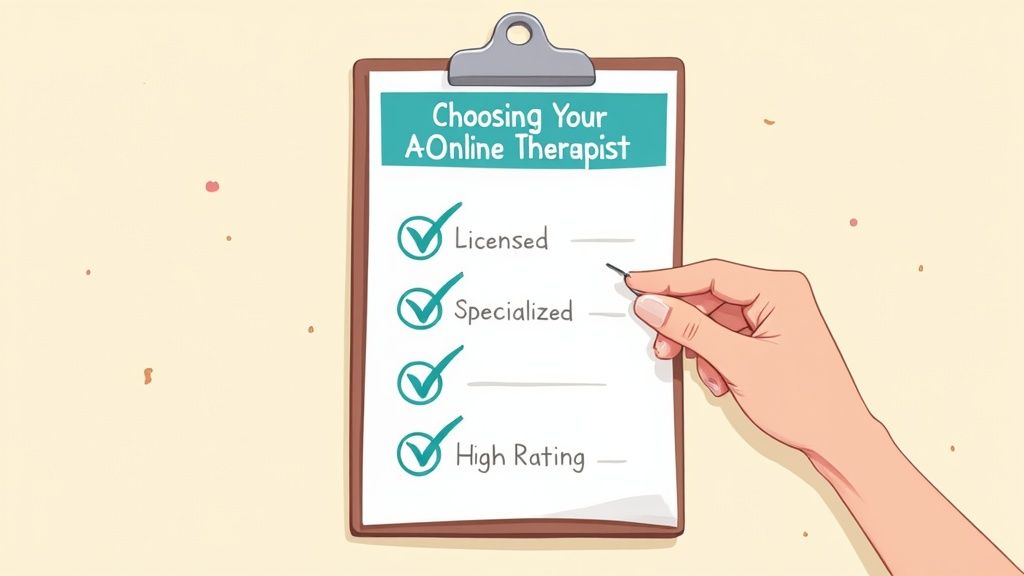That feeling of staring at a never-ending to-do list, completely overwhelmed by the day's demands? It's an experience more and more adults are starting to recognize as a sign of something deeper. As awareness of ADHD grows, people are seeking support that actually fits into their already complicated lives. That’s where ADHD online therapy comes in—it’s a way to get professional guidance, diagnosis, and practical skills from the comfort of your own home, making quality care more accessible than it's ever been.
Why Accessible ADHD Care Matters More Than Ever

The conversation around Attention-Deficit/Hyperactivity Disorder (ADHD) has finally moved past the outdated myth that it's just a childhood issue people "grow out of." We now have a much clearer understanding of how ADHD shows up in adults, affecting everything from performance at work and personal relationships to emotional regulation and self-esteem.
This shift in awareness is showing up in the numbers. As of 2025, it's estimated that 404 million adults worldwide have ADHD. In the United States alone, that figure is over 16 million. This isn't just a trend; it's a clear signal that we need support systems that are both effective and convenient. You can dig into more of these recent ADHD statistics on jilljohnsoncoaching.com.
Overcoming Traditional Barriers to Treatment
For most adults juggling a career, family, and countless other commitments, traditional in-person therapy can feel like an impossible ask. Finding the time for appointments, dealing with a commute, and navigating the stigma that can still exist around seeking help often feels like just one more overwhelming task to add to the list.
ADHD online therapy cuts through these challenges by eliminating the geographical and logistical roadblocks. It provides a real path to consistent, high-quality care that fits into your life, instead of disrupting it.
This is about more than just convenience. It's about creating a sustainable way for adults to get the tools they need to thrive. Virtual care makes it possible to build momentum and stay engaged with your treatment, which is absolutely essential for managing ADHD effectively.
The goals of this new model of care are straightforward:
- Increase Accessibility: Provide expert care to anyone, anywhere, without the need to find a specialist in your immediate area.
- Promote Consistency: Make it easier to attend sessions regularly, which is vital for building new skills and seeing real progress.
- Reduce Stigma: Offer a private, comfortable space where you can openly discuss your challenges and goals without judgment.
Ultimately, ADHD online therapy is a practical response to the demands of modern life, offering a clear roadmap to help you find clarity and a sense of control.
How ADHD Online Therapy Actually Works
Ever wonder what virtual therapy really looks like? The process of starting ADHD online therapy is a lot more straightforward and supportive than you might think. Just picture your trusted therapist's office, but instead of dealing with traffic and a waiting room, you connect through a secure video call from a place where you feel most comfortable and can actually focus.
Your journey kicks off with a confidential consultation. This is your chance to talk about the challenges you're facing, get your questions answered, and get a feel for the provider's approach. It's a low-pressure way to see if it’s the right fit for you before jumping into a full evaluation.
If you decide to move forward, the next step is usually a comprehensive diagnostic assessment. This isn't just a simple checklist; it's a deep dive conducted by a qualified psychologist using clinically validated tools and in-depth interviews. The goal is to get an accurate understanding of your unique neurotype, which is the bedrock of any truly effective treatment.
Your Personalized Treatment Journey
Once an ADHD diagnosis is confirmed, you and your therapist will work together to create a personalized treatment plan. This is a collaborative effort, not a one-size-fits-all prescription. It’s a carefully built roadmap designed to address your specific goals, whether that’s improving focus at work, getting a handle on emotional regulation, or building stronger organizational skills.
This infographic gives you a quick look at the typical flow, from that first call to your ongoing care.
As you can see, it’s a structured, client-focused process that puts an accurate assessment first before moving into therapeutic sessions built just for you.
Proven, evidence-based methods are at the heart of these plans. Techniques like Cognitive Behavioral Therapy (CBT) and specialized executive function coaching are skillfully adapted for the digital space. For instance, your therapist might use a shared digital whiteboard during a video call to map out thought patterns or help you break down a massive project into bite-sized, manageable steps. It’s all about equipping you with practical, real-world strategies you can use right away.
Comparing Online Therapy with In-Person Therapy for ADHD
Deciding between online and in-person therapy can feel like a big choice. Both have their unique advantages, and what works best really depends on your individual needs, lifestyle, and comfort level. To help you weigh the options, here’s a straightforward comparison of the key features.
| Feature | ADHD Online Therapy | In-Person Therapy |
|---|---|---|
| Accessibility | Accessible from anywhere with an internet connection, breaking down geographical barriers. | Requires physical travel to a specific office location, which can be limiting. |
| Convenience | Sessions can be scheduled more flexibly, saving time on travel and fitting into busy schedules. | Appointments are often during standard business hours and require commute time. |
| Comfort | Sessions are held in your own familiar and private environment, which can make it easier to open up. | Sessions are in a formal clinical setting, which some find comforting and others find intimidating. |
| Technology | Relies on a stable internet connection and a private device. Technical issues can sometimes occur. | No technological requirements; communication is face-to-face, which some people prefer. |
| Cost | Often more affordable due to lower overhead for providers; eliminates travel costs. | Can be more expensive; includes costs associated with travel and potentially childcare. |
| Anonymity | Offers a higher degree of privacy, as there's no risk of being seen in a waiting room. | Less anonymous, as you are physically present in a public-facing office. |
Ultimately, both formats aim for the same goal: providing effective, evidence-based support for managing ADHD. The "better" choice is simply the one that removes the most barriers for you and allows you to engage with the therapeutic process consistently and comfortably.
The Structure of Virtual Sessions
So, what actually happens during a typical session? It’s a lot like an in-person meeting, built around a focused, one-on-one conversation. You and your therapist will work through your treatment plan, celebrate your wins, and troubleshoot any challenges that have come up.
The core of effective therapy—the relationship built on trust and understanding—translates powerfully to a virtual setting. Many find it easier to open up from the security of their own space, leading to more productive and honest conversations.
Many online platforms also offer support between your scheduled sessions, which is a huge plus. This might include:
- Secure Messaging: A way to ask a quick question or share an update with your therapist without waiting for your next appointment.
- Digital Tools: Access to apps or worksheets for tracking habits, practicing new skills, and reinforcing what you learn in therapy.
- Resource Libraries: A collection of articles, videos, and guides to help you deepen your understanding of ADHD.
This kind of continuous support makes the process feel less like a series of isolated appointments and more like an ongoing partnership in your well-being. You can explore how our structured online ADHD therapy programs at the Sachs Center work to provide consistent, effective care. This modern approach ensures that legitimate, evidence-based treatment isn't just a backup plan but a powerful and effective way to manage ADHD.
The Real Benefits of Choosing Virtual ADHD Care
The idea of ADHD online therapy is about more than just dodging traffic. For adults navigating the complexities of ADHD, virtual care fundamentally changes the game, making consistent, effective support a practical reality instead of an out-of-reach ideal.
Think about the busy professional who can finally squeeze in a session on their lunch break without burning half a day of PTO. Or the parent who can get expert help from their living room, skipping the logistical nightmare of finding a babysitter. These aren't just small conveniences; they're total game-changers that dismantle the biggest barriers to getting help.
This shift isn't just a niche trend. The COVID-19 pandemic threw telehealth into the mainstream, and it stuck. Behavioral health visits conducted virtually jumped from 41% to 67% between 2020 and 2023. This proves that for many, online care isn't a temporary workaround—it’s a better, more sustainable model. You can dig into more of the latest ADHD data from our friends at qbtech.com.
Removing Geographic and Emotional Barriers
One of the most powerful things about online therapy is that it makes geography irrelevant. If you live in a rural town or even a city with a shortage of adult ADHD specialists, your options have always been frustratingly slim. Virtual care blows those doors wide open, connecting you to top-tier psychologists no matter what your zip code is.
Suddenly, you have access to a world of expertise. You’re no longer stuck with the few practitioners nearby. Instead, you can find a therapist who truly gets the nuances of adult ADHD, including how it shows up differently in women or other highly masked individuals.
For many people, just the thought of walking into a clinic can be a source of anxiety. Being able to have these conversations from the comfort and privacy of home can lower that barrier significantly, making it easier to be vulnerable.
When you feel safe and comfortable in your own space, you're far more likely to open up and be honest. That feeling of security helps you stay engaged with your treatment plan, which is absolutely essential for building new skills and making real, lasting progress.
Greater Flexibility and Deeper Engagement
The beauty of ADHD online therapy is that it’s designed to fit into your life, not the other way around. This flexibility makes a huge difference in your ability to actually stick with it long enough to see results.
Here are a few ways it fosters better engagement:
- Reduced "Time Tax": Traditional therapy isn't just the 50-minute session. It's the commute, the waiting room, and the travel back. Online therapy wipes that "time tax" off the books, making it so much easier to fit into a packed schedule.
- Access to Digital Tools: Many online platforms offer more than just video calls. You might get access to secure messaging with your therapist, digital worksheets, or habit trackers that support you in between your appointments.
- A Comfortable Setting: When you're in a familiar environment, your nervous system can relax. This frees up your brain to focus and absorb the new strategies you're discussing in your session.
These pieces all work together to create a supportive system that encourages consistency. Virtual care isn't just a different way to do therapy—for many adults with ADHD, it's a more effective and sustainable path to getting the support they need to thrive.
How to Find the Right Online ADHD Therapist
Choosing a therapist is one of the biggest steps you’ll take, and finding the right fit is everything. Think of it like putting together your own personal support team—you want experts who not only have the right qualifications but also really get you and your specific needs. The goal is to find someone who makes you feel seen, heard, and confident in the path forward.
Let's start with the basics. Any qualified therapist will have credentials, but for ADHD, you need someone with specialized experience. This isn't a generalist's game. Managing adult ADHD requires a deep understanding of its unique challenges, from executive dysfunction to emotional regulation.
First and foremost, look for a professional who is licensed to practice in your state. This is non-negotiable. It ensures they meet all the legal and ethical standards for care. Most telehealth platforms make this easy to check, but it’s always smart to double-check yourself.
Key Credentials and Specializations to Look For
When you're looking for providers for ADHD online therapy, your checklist needs to go beyond just a license. You're looking for a specific skill set—one that’s fine-tuned for the neurodivergent brain.
Here are the key qualifications to prioritize:
- Specialization in Adult ADHD: Make sure the therapist has specific training and dedicates a good chunk of their practice to adults with ADHD.
- Evidence-Based Approaches: Look for experience with methods like Cognitive Behavioral Therapy (CBT), which has been proven highly effective for building ADHD management skills.
- Understanding of Co-occurring Conditions: Many adults with ADHD also deal with anxiety or depression. A great therapist knows how to address these interconnected issues.
Finding the right therapist is about both credentials and connection. You need someone who has the technical expertise but also possesses the empathy to create a safe, non-judgmental space for you to grow.
Once you’ve got a shortlist of a few candidates, it’s time for the consultation. This is your chance to interview them and see if their style clicks with your goals. For more in-depth advice, check out our complete guide on how to find an ADHD therapist for adults.
Essential Questions for Your Consultation
That first consultation isn't just a formality; it’s a crucial screening process. Don't be shy about asking direct questions to get a feel for their methods and philosophy. A good therapist will welcome this conversation.
Come prepared with a few key inquiries:
- What is your treatment philosophy for adult ADHD? This helps you see if they focus on skill-building, medication management, or a blend of both.
- How do you handle communication between sessions? Knowing their policy on secure messaging or check-ins tells you a lot about their level of support.
- How do you collaborate with other providers, like a psychiatrist for medication? If medication is part of your plan, you need to know that communication will be seamless for your care to be effective.
Asking these questions puts you in the driver's seat, ensuring you partner with a professional who is truly equipped to support you on your journey.
The Future of Digital ADHD Treatment
The world of ADHD online therapy is moving way beyond simple video chats. We're stepping into a new era where technology isn't just a bridge for communication—it's becoming an active partner in your treatment. This is creating a much more responsive and personalized way to manage ADHD.
Imagine if your therapy was backed by tools that gave you real-time feedback on your focus. Or what if you could track your executive function patterns throughout the day and get immediate support right when you need it? This isn't science fiction anymore. It’s the emerging reality of digital therapeutics.
These breakthroughs are turning ADHD online therapy into a dynamic, integrated part of daily life.
The Rise of Digital Therapeutics and AI
Digital therapeutics (DTx) are essentially clinically-proven software programs built to treat medical conditions. For someone with ADHD, this might look like an app that uses engaging games to strengthen working memory. It could also be a wearable device that alerts you when your biometric data shows stress levels are rising, prompting you to use a specific CBT technique you learned in therapy.
This is all part of a huge wave in digital health. The global mobile health app market is expected to jump from $2.4 billion in 2017 to over $11.2 billion by 2025. The promise is incredible, but there's a catch: validation. Right now, only about 2.08% of digital mental health apps have published clinical evidence to back up their claims. You can dive deeper into emerging ADHD research over at qbtech.com.
This data-driven approach allows therapists to see what’s happening outside the therapy session. It gives them objective insights into your daily struggles and successes, which leads to a far more precise and effective treatment plan.
By bringing these tools into the fold, therapists can offer a truly continuous model of care.
- AI-Driven Insights: Artificial intelligence can sift through data from your apps and wearables to spot patterns. Your therapist can then use these insights to fine-tune your strategies.
- Personalized Interventions: Your care plan can adapt in real time, offering you support that is perfectly timed to what you're experiencing at that moment.
- Enhanced Skill Building: These digital tools help reinforce the skills you learn in therapy, making it easier to build habits that stick.
This blend of technology and expert human care is building a future where comprehensive ADHD treatment is more accessible, responsive, and deeply personalized than ever before.
Your Questions About ADHD Online Therapy Answered
Dipping your toes into the world of ADHD online therapy is bound to bring up some questions. It's totally normal to wonder about how it all works, if it's effective, and what it costs. Let's walk through some of the most common uncertainties so you can feel confident moving forward.
Is Online Therapy as Effective as In-Person Therapy?
This is probably the biggest question on everyone's mind: can a virtual session really be as good as sitting in a therapist's office? The short answer is a resounding yes. Study after study has shown that for many conditions, ADHD included, telehealth provides outcomes that are right on par with traditional in-person care.
This is especially true for skill-building therapies like Cognitive Behavioral Therapy (CBT). Honestly, the success of any therapy—online or off—boils down to the relationship you build with your provider. A strong, trusting connection is absolutely achievable through a screen.
The key isn't the physical room you're in; it's the quality of the interaction and the expertise of the therapist. A well-structured virtual environment can be just as safe and effective for building the skills needed to manage ADHD.
Can I Get a Diagnosis and Medication Online?
Yes, you can. A reputable online practice will offer a comprehensive diagnostic evaluation and medication management, all through telehealth. The diagnostic process isn't just a quick chat; it's a multi-step approach that often includes clinically validated assessments, detailed self-report questionnaires, and deep-dive interviews with a licensed psychologist. This ensures the process is every bit as thorough as an in-person evaluation.
Getting medication online is also straightforward, though it's handled with great care:
- First, a qualified medical provider (like a psychiatrist or psychiatric nurse practitioner) will conduct an evaluation to see if medication is the right fit for your treatment plan.
- If a prescription is made, it's sent electronically to the pharmacy you choose.
- You'll then have regular follow-up appointments to monitor your progress, check in on how you're feeling, and make any adjustments safely.
Will My Insurance Cover Online ADHD Therapy?
Figuring out insurance can feel like a maze, but the good news is that many plans now offer solid coverage for telehealth, including mental health services. The trick is to check your specific benefits before you start.
When you call your insurance company, get straight to the point. Ask these specific questions to get the clarity you need:
- Does my plan cover telehealth appointments for mental or behavioral health?
- Are there any specific requirements or limitations for ADHD online therapy coverage?
- What are my co-pays or deductibles for these virtual services?
And if your insurance doesn't cover the provider you're interested in, don't forget to ask about out-of-network benefits. Many providers also offer self-pay options, which gives you more flexibility and control over your care.
Ready to get the clarity you deserve? The Sachs Center specializes in telehealth-based diagnostic evaluations and evidence-based treatment for ADHD and Autism. Our expert psychologists understand the nuances of neurodiversity and provide compassionate care from the comfort of your home. Book your evaluation today.


